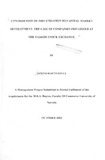| dc.contributor.author | Giti, Daniel M | |
| dc.contributor.author | K'Akumu, O. A. | |
| dc.contributor.author | Ondieki, E. O. | |
| dc.date.accessioned | 2020-08-13T09:09:09Z | |
| dc.date.available | 2020-08-13T09:09:09Z | |
| dc.date.issued | 2020-06-06 | |
| dc.identifier.citation | Giti, D. M., K'Akumu, O. A., & Ondieki, E. O. (2020). Enhanced role of private sector through public private partnerships in low income urban housing in Kenya. Journal of Financial Management of Property and Construction. | en_US |
| dc.identifier.uri | https://www.emerald.com/insight/content/doi/10.1108/JFMPC-07-2019-0057/full/html | |
| dc.identifier.uri | http://erepository.uonbi.ac.ke/handle/11295/152903 | |
| dc.description.abstract | Purpose – Low income urban housing in Kenya is underdeveloped as a result of uninnovative financing, hence the many slums and informal settlements in the country, hence the need for enhanced participation of the private sector through application of Public Private Partnerships (PPPs), which has been cited as one of the possible solutions. The purpose of this study was to investigate and make predictions of the need for enhanced role of private sector in developing low income urban housing in Kenya through PPPs. Design/methodology/approach – Delphi method of research was used to forecast the enhanced role of private sector through PPPs in the development of low income urban housing in Kenya. Three rounds Delphi iterations using three panels of housing financiers (30 in number), housing developers (28 in number) and housing practitioners (30 in number) were used. Data was collected through questionnaires throughout the three rounds, where the first round was exploratory in nature, the second round built on answers from round one, while round three was based on answers from round two, after which the mean and standard deviation values were calculated to show the level of consensus. Findings – Results showed that PPPs is one of the plausible ways through which low income urban housing in Kenya can be developed to address its shortage. Private sector in PPP transaction brings innovative technology, finance and efficiency, while government brings its assets such as land and other regulations long term contracts. Research limitations/implications – The research was focussed on the Nairobi city county area in analysing the need for enhanced role of the private parties. It focussed on a panel of Housing practitionersofficers in the State Department for housing and Nairobi city county; housing financiers and housing developers, without interviewing the beneficiaries of the method. Practical implications – It was, therefore, found out that PPPs models are applicable in developing low income urban housing because the country has the enabling environment for its effective application going forward. The implication of this study is that low income urban housing can be developed through the model. | en_US |
| dc.language.iso | en_US | en_US |
| dc.publisher | Emerald | en_US |
| dc.subject | Innovative financing, Low cost housing, Public private partnerships, Private and public sector/entities, Private party/entity/player | en_US |
| dc.title | Enhanced role of private sector through public private partnerships in low income urban housing in Kenya | en_US |
| dc.type | Article | en_US |



